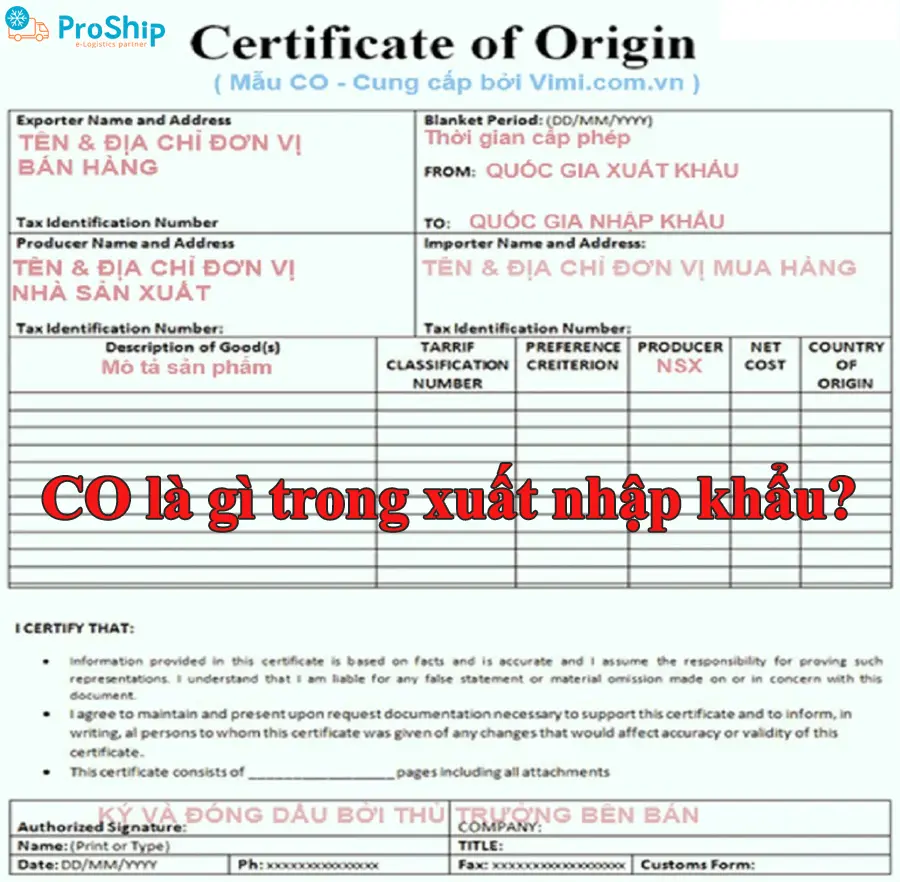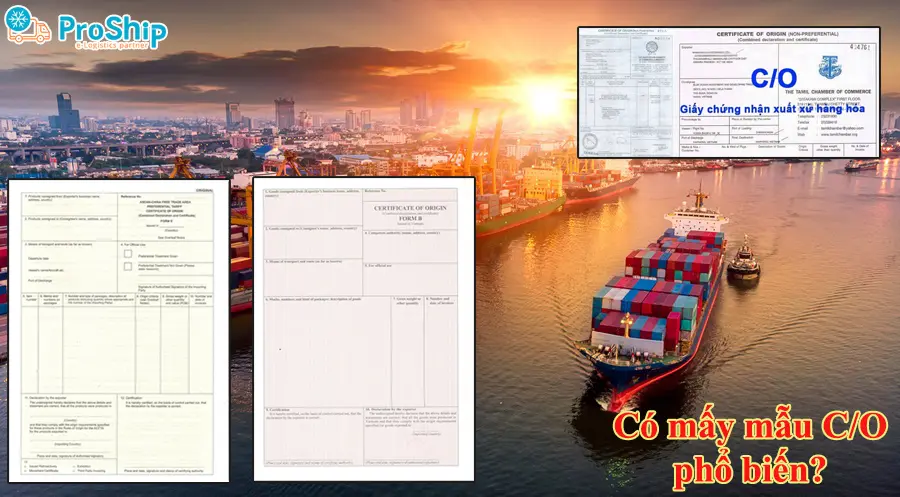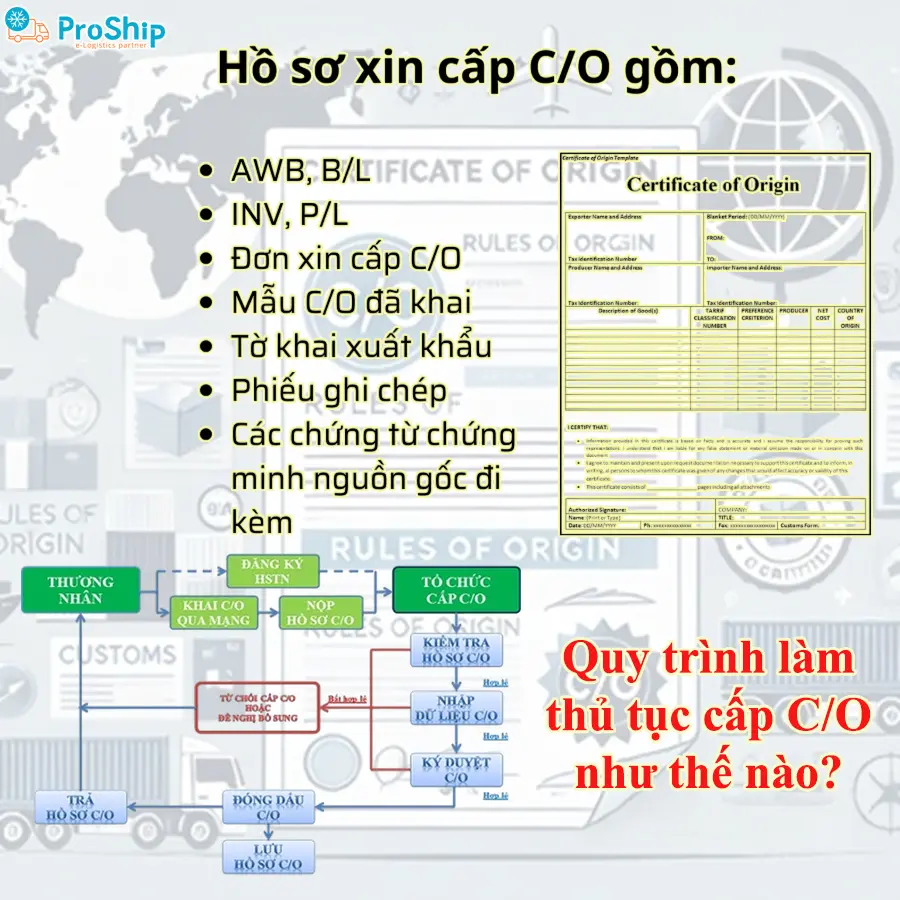x Doanh nghiệp bạn mới tham gia vào hoạt động XNK hàng hóa cần tìm hiểu C/O là gì?
x Các chủ hàng cần biết điều kiện để được cấp CO là gì? CO có vai trò gì trong XNK?
x Bạn muốn biết quy trình, thủ tục xin cấp CO trong XNK được tiến hành thế nào?
Bạn thắc mắc CO là gì trong xuất nhập khẩu, hãy cùng Proship.vn chúng tôi tìm đọc bài chia sẻ sau để có lời giải đáp chuẩn nhất. Đồng thời, thông qua đây bạn cũng biết điều kiện được cấp CO là gì, cơ quan nào cấp phát CO, quy trình xin cấp CO ra sao,…và một số kiến thức khác liên quan tới CO.
C/O là gì? Điều kiện cấp và có vai trò gì trong XNK?
Trong hoạt động XNK, C/O là gì và cần đáp ứng điều kiện gì để được cấp C/O? Câu trả lời là:
CO là gì?
CO là gì trong xuất nhập khẩu? CO (Certificate of Origin) là chứng nhận xuất xứ hàng hóa được cấp bởi cơ quan có thẩm quyền tại nước xuất khẩu dành cho hàng hóa được sản xuất tại nước đó. CO bắt buộc phải tuân thủ theo những quy định của nước xuất khẩu và cả nước nhập khẩu.

Điều kiện cấp C/O
Điều kiện xin cấp C/O phải thỏa mãn 1 trong 2 trường hợp:
1. 100% hàng hóa xuất xứ thuần túy phải được thu hoạch hoặc sản xuất tại quốc gia, nhóm nước hay một vùng lãnh thổ đó;
2. Hàng hóa có xuất xứ không thuần túy nhưng đảm bảo điều kiện:
- Hàng hóa có các chỉ số RVC và LVC phải đạt chỉ số thỏa mãn theo Danh mục Quy tắc cụ thể do Bộ Công thương quy định;
- Mã HS code của các nguyên vật liệu đầu vào phải có sự thay đổi so với mã HS code của thành phẩm đầu ra ở cấp độ 4 số. Điều này cũng đã được quy định theo Danh mục Quy tắc cụ thể mặt hàng do Bộ Công Thương cấp phép.
Vai trò của CO
Vai trò của C/O được thể hiện:
- Thống kê thương mại: CO giúp các quốc gia xác định lượng kim ngạch XNK các loại hàng hóa;
- Hưởng ưu đãi thuế quan: CO giúp doanh nghiệp xác định được các ưu đãi sẽ được hưởng khi xuất khẩu hàng hóa đi các nước;
- Đảm bảo quy chuẩn quốc tế về nhãn mác, bao bì;
- Thúc đẩy thương mại giữa các nước;
- Giảm bán phá giá và đội giá: Nhờ xác định được xuất xứ từng mặt hàng mà Nhà nước có thể xác định chính xác nơi đã sản xuất hàng hóa đó, có thể tìm hiểu chính sách về giá cả và quy định liên quan khi nhập khẩu.
C/O trong XNK sử dụng nhằm mục đích gì? Được cấp phát bởi cơ quan nào?
Mục đích của CO là gì trong xuất nhập khẩu và do cơ quan nào cấp phát? Proship giải đáp như sau:
Mục đích sử dụng CO
CO mang lại nhiều lợi ích cho bên mua, bên bán:
- Với bên mua bán: Điều kiện hoàn thành nhiều thủ tục hải quan, để hàng hoá có đủ điều kiện xuất khẩu ra thị trường nước ngoài.
- Với Nhà nước: Theo dõi các thống kê thương mại, áp dụng những chính sách hỗ trợ phù hợp.
Cơ quan cấp phát CO
Có hai cơ quan có thẩm quyết cấp phát CO tại Việt Nam:
- Bộ Công thương: Bộ Công thương có quyền cấp phát các CO form A, D và các C theo sự thỏa thuận giữa các Chính phủ.
- VCCI (Vietnam Chamber Of Commerce and Industry) – Phòng công nghiệp và thương mại Việt Nam: Cấp phát các form CO còn lại hoặc form CO do Bộ Công thương ủy quyền.
Có mấy mẫu C/O phổ biến? C/O ưu đãi với C/O không ưu đãi có gì khác nhau?
Proship liệt kê các mẫu CO và chỉ ra sự khác nhau giữa CO ưu đãi với CO không ưu đãi:
Một số mẫu CO thông dụng
Một số mẫu C/O phổ biến gồm:
- C/O mẫu D: Giấy Do cơ quan có thẩm quyền của nước xuất khẩu cấp cho các loại hàng hóa xuất sang các nước trong ASEAN.
- C/O mẫu AANZ: C/O ưu đãi cung cấp cho hàng hóa của các nước ASEAN, Australia và New Zealand.
- C/O mẫu AK: Chứng nhận xuất xứ hàng xuất sang Hàn Quốc và các nước thành viên trong hiệp hội ASEAN.
- C/O mẫu AI: C/O ưu đãi cấp cho hàng Việt Nam xuất khẩu sang Ấn Độ và các nước thành viên trong Hiệp định thương mại đa phương AIFTA.
- C/O mẫu AJ: C/O ưu đãi được cấp cho hàng hóa có xuất xứ tại Việt Nam xuất khẩu sang Nhật Bản cùng với các nước thành viên có trong hiệp định thương mại đa phương ACCEP.
- C/O mẫu E: Phát hành theo hiệp định khung về hợp tác kinh tế toàn diện ASEAN – Trung Quốc (ACFTA).
- C/O mẫu AHK: Áp dụng đối với các mặt hàng xuất nhập khẩu đi Hồng Kông (Trung Quốc) và các nước trong khối ASEAN.
- C/O mẫu RCEP: C/O của Hiệp định Đối tác kinh tế toàn diện khu vực (RCEP).
- C/O mẫu CPTPP: C/O ưu đãi cấp cho hàng hóa Việt Nam xuất khẩu sang các nước thành viên trong Hiệp định CPTPP.
- C/O mẫu VK: C/O ưu đãi được cấp cho hàng hóa có xuất xứ tại Việt Nam xuất khẩu sang Hàn Quốc.
- C/O mẫu VJ: C/O dùng thường xuyên trong các giao dịch thương mại giữa Việt Nam và Nhật Bản.
- C/O mẫu VC: C/O chứng nhận xuất xứ ưu đãi thuế quan trong hiệp định thương mại đa phương của ASEAN và Trung Quốc.
- C/O mẫu VN–CU: Cấp cho hàng hóa Việt Nam xuất khẩu sang Cuba.
- C/O mẫu S: Sử dụng cho các loại hàng hóa xuất khẩu sang Lào.

So sánh CO ưu đãi và CO không ưu đãi
Sự khác nhau giữa CO ưu đãi và CO không ưu đãi thể hiện qua bảng sau:
| TIÊU CHÍ | CO ƯU ĐÃI | CO KHÔNG ƯU ĐÃI |
| Mục đích | Chứng nhận xuất xứ và hưởng ưu đãi thuế quan | Chỉ chứng nhận xuất xứ |
| Đối tượng áp dụng | Hàng hóa có xuất xứ từ các nước/nhóm nước được hưởng ưu đãi | Tất cả các loại hàng hóa |
| Cơ quan cấp | Tùy thuộc vào từng loại CO và hiệp định thương mại | Phòng Thương mại và Công nghiệp Việt Nam (VCCI) |
| Thủ tục cấp | Phức tạp hơn, yêu cầu nhiều chứng từ hơn | Đơn giản hơn |
| Lợi ích | Giảm thuế nhập khẩu, tăng khả năng cạnh tranh | Chứng minh nguồn gốc hàng hóa |
Quy trình các bước làm thủ tục cấp C/O hiện nay
CO là gì trong xuất nhập khẩu đã được giải đáp…Sau đây là thủ tục xin cấp CO:
Bước 1: Đăng ký hồ sơ thương nhân (nếu làm thủ tục cấp CO lần đầu)
Một số giấy tờ nộp khi khách hàng lần đầu làm thủ tục xin cấp CO gồm:
- Con dấu thương nhân và đăng ký mẫu chữ ký của người được ủy quyền ký đơn đề nghị cấp CO;
- Giấy phép đăng ký kinh doanh;
- Giấy chứng nhận đăng ký mã số thuế (bản sao y công chứng);
- Danh mục nhà máy, xưởng sản xuất.

Bước 2: Sau khi nhận hồ sơ, các cán bộ sẽ tiếp nhận và kiểm tra thông tin
Các cán bộ sẽ gửi lại thông tin trong một số trường hợp:
- Được cấp CO và báo rõ thời gian cấp;
- Đề nghị người gửi bổ sung chứng từ;
- Đề nghị người gửi kiểm tra lại chứng từ về các lỗi sai, thiếu thông tin;
- Một số trường hợp sẽ bị từ chối cấp CO theo quy định pháp luật.
Bước 3: Trả giấy chứng nhận xuất xứ CO
CO là gì trong xuất nhập khẩu, mục đích sử dụng CO là gì, thủ tục xin cấp CO thế nào, cần điều kiện gì để được cấp CO,…là những nội dung liên quan đã được chuyển tải bởi Proship Logistics. Quý doanh nghiệp, chủ hàng chưa có nhiều kinh nghiệm hoặc mới lần đầu tham gia vào hoạt động XNK hàng hóa cần cập nhật ngay hoặc liên hệ 0909 344 247 để được giải đáp và tư vấn các giải pháp vận chuyển hàng Đa phương thức trọn gói giá tốt nhất.

